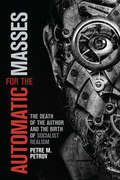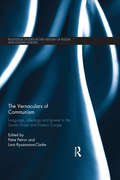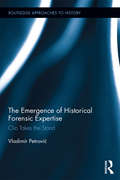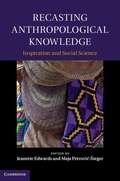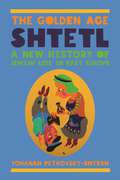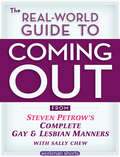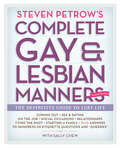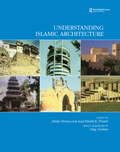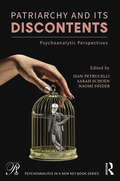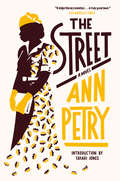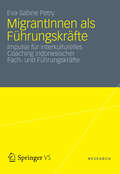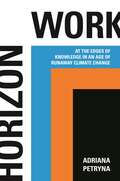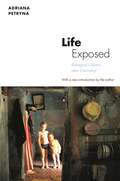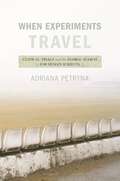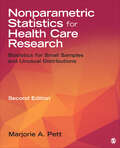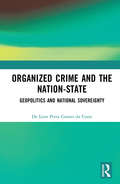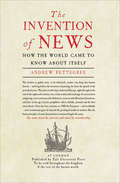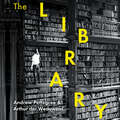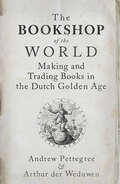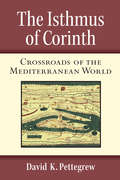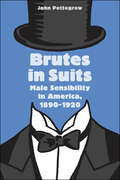- Table View
- List View
Automatic for the Masses
by Petre M. PetrovAt the end of the 1920s, the Modernist and avant-garde artistic programmes of the early Soviet Union were swept away by the rise of Stalinism and the dictates of Socialist Realism. Did this aesthetic transition also constitute a conceptual break, or were there unseen continuities between these two movements? In Automatic for the Masses, Petre M. Petrov offers a novel, theoretically informed account of that transition, tracing those connections through Modernist notions of agency and authorship.Reading the statements and manifestos of the Formalists, Constructivists, and other Soviet avant-garde artists, Petrov argues that Socialist Realism perpetuated in a new form the Modernist "death of the author." In interpreting this symbolic demise, he shows how the official culture of the 1930s can be seen as a perverted realization of modernism's unrealizable project. An insightful and challenging interpretation of the era, Automatic for the Masses will be required reading for those interested in understanding early Soviet culture.
The Vernaculars of Communism: Language, Ideology and Power in the Soviet Union and Eastern Europe (Routledge Studies in the History of Russia and Eastern Europe)
by Petre Petrov Lara Ryazanova-ClarkeThe political revolutions which established state socialism in the Soviet Union and Eastern Europe were accompanied by revolutions in the word, as the communist project implied not only remaking the world but also renaming it. As new institutions, social roles, rituals and behaviours emerged, so did language practices that designated, articulated and performed these phenomena. This book examines the use of communist language in the Stalinist and post-Stalinist periods. It goes beyond characterising this linguistic variety as crude "newspeak", showing how official language was much more complex – the medium through which important political-ideological messages were elaborated, transmitted and also contested, revealing contradictions, discursive cleavages and performative variations. The book examines the subject comparatively across a range of East European countries besides the Soviet Union, and draws on perspectives from a range of scholarly disciplines – sociolinguistics, anthropology, literary and cultural studies, historiography, and translation studies. Petre Petrov is an Assistant Professor in the Department of Slavic Languages and Literatures at the University of Texas at Austin. Lara Ryazanova-Clarke is Head of Russian and Academic Director of the Princess Dashkova Russia Centre in the School of Literatures, Languages and Cultures at the University of Edinburgh.
The Emergence of Historical Forensic Expertise: Clio Takes the Stand (Routledge Approaches to History)
by Vladimir PetrovićThis book scrutinizes the emergence of historians participating as expert witnesses in historical forensic contribution in some of the most important national and international legal ventures of the last century. It aims to advance the debate from discussions on whether historians should testify or not toward nuanced understanding of the history of the practice and making the best out of its performance in the future.
World Cultures
by Michael B. Petrovich Arthur D. Roberts Christine M. RobertsWorld Cultures textbook for 6th grade
Recasting Anthropological Knowledge
by Maja Petrović-Šteger Jeanette EdwardsThis collection of original essays provides an innovative and multifaceted reflection on the impact and inspiration of the scholarship of eminent anthropologist Marilyn Strathern. A distinguished team of international contributors, all former students of Strathern, reflect on the impact of their relationship with their teacher and address the wider conceptual contribution of her work through their own writings. The essays provide an accessible entry into Strathern's scholarship for those new to her work and a rich source of material which mobilises and deploys her concepts, including new ethnographic examples and discussion of contemporary political issues, for those more familiar with her scholarship. The result is a collection that dissects, contextualises and reroutes concepts of relationality, inspiration and knowledge in novel and unpredictable ways. Recasting Anthropological Knowledge will prove invaluable to all students of anthropology and will be of interest to scholars across the social sciences.
The Golden Age Shtetl: A New History of Jewish Life in East Europe
by Yohanan Petrovsky-ShternA major history of the shtetl's golden ageThe shtetl was home to two-thirds of East Europe's Jews in the eighteenth and nineteenth centuries, yet it has long been one of the most neglected and misunderstood chapters of the Jewish experience. This book provides the first grassroots social, economic, and cultural history of the shtetl. Challenging popular misconceptions of the shtetl as an isolated, ramshackle Jewish village stricken by poverty and pogroms, Yohanan Petrovsky-Shtern argues that, in its heyday from the 1790s to the 1840s, the shtetl was a thriving Jewish community as vibrant as any in Europe.Petrovsky-Shtern brings this golden age to life, looking at dozens of shtetls and drawing on a wealth of never-before-used archival material. Illustrated throughout with rare archival photographs and artwork, this nuanced history casts the shtetl in an altogether new light, revealing how its golden age continues to shape the collective memory of the Jewish people today.
The Real-World Guide to Coming Out: From Steven Petrow’s Complete Gay & Lesbian Manners: A Workman Short
by Steven Petrow Sally ChewWe’ve come a long way. But that doesn’t mean that the process of coming out is clear-cut or without obstacles. Introducing an e-book for today’s times—adapted from Steven Petrow’s Complete Gay & Lesbian Manners—designed to help guide men, women, and teenagers navigate what can be uncertain territory. Packed with Q&As, polls, and “Straight Talk” from straight friends and family members), THE REAL-WORLD GUIDE TO COMING OUT covers it all. Why you should come out, and when. Whom to approach first (in a poll, 50% chose a LBGT friend). How to write a coming-out letter. How to tell your children in an age-appropriate way. Staying safe at school and other help for young people. Plus how to handle homophobia and hostility, to tell or not to tell at the workplace, coming out when you’re older, the unique challenges faced by the transitioning person, and becoming a mentor to others. Workman Shorts is a new line of bite-size, subject-specific e-books curated from our library of trusted books and authors.
Steven Petrow's Complete Gay & Lesbian Manners: The Definitive Guide to LGBT Life
by Steven Petrow Sally Chew**In recognition of Quality, Excellence, and Design, this ebook has been granted a QED seal of approval from Digital Book World.**Finally, the first big book of manners for the more than 15 million lesbian, gay, bisexual, and transgender people in the United States and Canada and the people who love them, work with them, and live with them. Written by Steven Petrow, the go-to authority on the subject—he’s the same-sex wedding expert at The New York Times and a columnist for The Huffington Post, Yahoo’s Shine, GayWeddings.com, and the “Q” Syndicate (with distribution to more than 100 LGBT newspapers and websites)—this is the definitive book of LGBT etiquette. Encyclopedic in its approach, filled with practical wisdom, lively wit, and much insight, Steven Petrow’s Complete Gay & Lesbian Manners covers everything: from coming out to being out in the workplace; from dealing with the joy and complexity of same-sex weddings and commitment ceremonies (including how to propose and write meaningful vows) to handling the legal paperwork every couple needs. There’s a chapter on sex etiquette, and another on the challenges and opportunities of raising a family, plus sections on travel, bullying, entertaining, meeting new friends, introducing your partner to your family, a primer on gay pride, and so much more. Throughout there are hundreds of questions—some posed by LGBT folk, and others by straight people: What do the mothers of two brides wear to a lesbian wedding? What do you say to an anti-gay joke? How do you answer “Who’s the father?” when there are two mothers?Manners, yes, but with a twist.
Understanding Islamic Architecture
by Attilo Petruccioli Khalil K. PiraniThe ongoing debate among practitioners and in academia about the meaning and understanding of Islamic architecture will be energized by this book. It contains essays by architects and academics from various parts of the world which clarify how the carious disciplines of the design profession can be employed to build in the spirit of Islam. Divided into three sections the book covers: *meaning from Faith, which draws meaning from the Islamic faith in order to propose a built environment that is universally beneficial*analysis of History, which examines historical buildings and planning concepts, and suggest how to apply lessons learned to contemporary practice*contemporary Trends, which discusses current trends in architecture, education and socio-economic aspects of various Muslim countries. Illustrated throughout, this book will appeal to students and scholars, practising architects and planners alike.
Patriarchy and Its Discontents: Psychoanalytic Perspectives (Psychoanalysis in a New Key Book Series)
by Jean Petrucelli Sarah Schoen Naomi SniderThis anthology of interviews and essays joins luminaries in contemporary psychoanalysis with pioneers of feminism to provide a timely analysis of the crushing effects of patriarchy and the role that psychoanalysis can play in moving us into a future defined by mutuality and respect. Departing from the contemporary psychoanalytic view that the socio-political and intrapsychic are inextricably linked, contributors use psychoanalysis as a tool to demystify and even dismantle patriarchy, while also examining how our theories, practices, and institutions have been implicated in it. The issues under examination here include important and often under-theorized topics such as institutional responses to boundary violations, the search for a black-feminist psychoanalytic theory, patriarchal enactments within the trans community, the persistence of patriarchy within contemporary psychoanalysis, and the impacts of patriarchy on diverse patient populations and ways to address this clinically. This book represents the first anthology comprised of voices from both within and outside the psychoanalytic realm, outlining a contemporary feminist psychoanalysis for both an analytic and non-analytic audience. It is invaluable for both psychoanalysts and for those in gender studies wishing to draw on psychoanalytic thinking.
The Street: A Novel
by Ann PetryTHE STREET tells the poignant, often heartbreaking story of Lutie Johnson, a young black woman, and her spirited struggle to raise her son amid the violence, poverty, and racial dissonance of Harlem in the late 1940s. Originally published in 1946 and hailed by critics as a masterwork, The Street was Ann Petry's first novel, a beloved bestseller with more than a million copies in print. Its haunting tale still resonates today.
MigrantInnen als Führungskräfte
by Eva-Sabine PetryInterkulturelles Coaching gilt als ideale Ergänzung zu interkulturellem Training für Expatriates. Ausländische Führungskräfte in Deutschland erhalten aber oft weder das eine noch das andere, sondern müssen sich selbst orientieren. Weltbild und Lernstil, die Migrationserfahrung und die asiatische Gewissensprägung spielen eine entscheidende Rolle in der Zusammenarbeit mit den oft hoch qualifizierten asiatischen MigrantInnen. Eva-Sabine Petry untersucht am Beispiel indonesischer Fach- und Führungskräfte, wie das westliche Konzept des Coaching adaptiert werden muss, damit es für MigrantInnen zur echten Unterstützung im Arbeitsalltag und bei der Übernahme von Führungsverantwortung wird. Sie zeigt darüber hinaus Wege zu gemeinsamem interkulturellen Lernen auf.
Horizon Work: At the Edges of Knowledge in an Age of Runaway Climate Change
by Adriana PetrynaA new way of thinking about the climate crisis as an exercise in delimiting knowable, and habitable, worldsAs carbon dioxide emissions continue to rise, Earth’s fragile ecosystems are growing increasingly unstable and unpredictable. Horizon Work explores how climate change is disrupting our fundamental ability to project how the environment will act over time, and how these rapidly faltering predictions are colliding with the dangerous new realities of emergency response.Anthropologist Adriana Petryna examines the climate crisis through the lens of “horizoning,” a mode of reckoning that considers unnatural disasters against a horizon of expectation in which people and societies can act. She talks to wildfire scientists who, amid chaotic fire seasons and shifting fire behaviors, are revising predictive models calibrated to conditions that no longer exist. Petryna tells the stories of wildland firefighters who could once rely on memory of previous fires to gauge the behaviors of the next. Trust in patterns has become an occupational hazard. Sometimes, the very concept of projection becomes untenable. Yet if all we see is doom, we will overlook something crucial about the scientific and ethical labor needed to hold back climate chaos. Here is where the work of horizoning begins.From experiments probing our planetary points of no return to disaster ecologies where the stark realities of climate change are being confronted, Horizon Work reveals how this new way of thinking has the power to reverse harmful legacies while turning voids where projection falters into spaces of collective action and recoverable futures.
Life Exposed: Biological Citizens after Chernobyl (In-formation Ser.)
by Adriana PetrynaOn April 26, 1986, Unit Four of the Chernobyl nuclear reactor exploded in then Soviet Ukraine. More than 3.5 million people in Ukraine alone, not to mention many citizens of surrounding countries, are still suffering the effects. Life Exposed is the first book to comprehensively examine the vexed political, scientific, and social circumstances that followed the disaster. Tracing the story from an initial lack of disclosure to post-Soviet democratizing attempts to compensate sufferers, Adriana Petryna uses anthropological tools to take us into a world whose social realities are far more immediate and stark than those described by policymakers and scientists. She asks: What happens to politics when state officials fail to inform their fellow citizens of real threats to life? What are the moral and political consequences of remedies available in the wake of technological disasters? Through extensive research in state institutions, clinics, laboratories, and with affected families and workers of the so-called Zone, Petryna illustrates how the event and its aftermath have not only shaped the course of an independent nation but have made health a negotiated realm of entitlement. She tracks the emergence of a "biological citizenship" in which assaults on health become the coinage through which sufferers stake claims for biomedical resources, social equity, and human rights. Life Exposed provides an anthropological framework for understanding the politics of emergent democracies, the nature of citizenship claims, and everyday forms of survival as they are interwoven with the profound changes that accompanied the collapse of the Soviet Union.
When Experiments Travel: Clinical Trials and the Global Search for Human Subjects
by Adriana PetrynaThe phenomenal growth of global pharmaceutical sales and the quest for innovation are driving an unprecedented search for human test subjects, particularly in middle- and low-income countries. Our hope for medical progress increasingly depends on the willingness of the world's poor to participate in clinical drug trials. While these experiments often provide those in need with vital and previously unattainable medical resources, the outsourcing and offshoring of trials also create new problems. In this groundbreaking book, anthropologist Adriana Petryna takes us deep into the clinical trials industry as it brings together players separated by vast economic and cultural differences. Moving between corporate and scientific offices in the United States and research and public health sites in Poland and Brazil, When Experiments Travel documents the complex ways that commercial medical science, with all its benefits and risks, is being integrated into local health systems and emerging drug markets. Providing a unique perspective on globalized clinical trials, When Experiments Travel raises central questions: Are such trials exploitative or are they social goods? How are experiments controlled and how is drug safety ensured? And do these experiments help or harm public health in the countries where they are conducted? Empirically rich and theoretically innovative, the book shows that neither the language of coercion nor that of rational choice fully captures the range of situations and value systems at work in medical experiments today. When Experiments Travel challenges conventional understandings of the ethics and politics of transnational science and changes the way we think about global medicine and the new infrastructures of our lives.
Nonparametric Statistics for Health Care Research: Statistics for Small Samples and Unusual Distributions
by Marjorie Marg PettWhat do you do when you realize that the data set from the study that you have just completed violates the sample size or other requirements needed to apply parametric statistics? Nonparametric Statistics for Health Care Research by Marjorie A. Pett was developed for such scenarios—research undertaken with limited funds, often using a small sample size, with the primary objective of improving client care and obtaining better client outcomes. Covering the most commonly used nonparametric statistical techniques available in statistical packages and on open-resource statistical websites, this well-organized and accessible Second Edition helps readers, including those beyond the health sciences field, to understand when to use a particular nonparametric statistic, how to generate and interpret the resulting computer printouts, and how to present the results in table and text format.
Nonparametric Statistics for Health Care Research: Statistics for Small Samples and Unusual Distributions
by Marjorie Marg PettWhat do you do when you realize that the data set from the study that you have just completed violates the sample size or other requirements needed to apply parametric statistics? Nonparametric Statistics for Health Care Research by Marjorie A. Pett was developed for such scenarios—research undertaken with limited funds, often using a small sample size, with the primary objective of improving client care and obtaining better client outcomes. Covering the most commonly used nonparametric statistical techniques available in statistical packages and on open-resource statistical websites, this well-organized and accessible Second Edition helps readers, including those beyond the health sciences field, to understand when to use a particular nonparametric statistic, how to generate and interpret the resulting computer printouts, and how to present the results in table and text format.
Organized Crime and the Nation-State: Geopolitics and National Sovereignty
by De Leon Petta Gomes da CostaGeopolitics is an increasingly important tool to understand national and international relations. This book unravels how organized crime is not just a marginal problem but part of a bigger geopolitical and asymmetrical warfare strategy. It seeks to establish a direct relationship between Nation States and organized crime groups. Many States have been using criminal and terrorist organizations as a policy for issues of national sovereignty or as a tool to strengthen a nation’s geopolitical position. This book demonstrates how national states are utilizing criminal organizations in covert operations and "dirty jobs" such as espionage, proxy war, arms trafficking and sabotage. Examples from the United States, China and the Soviet Union are explored, providing both an historical and contemporary analysis, from World War II through to the Cold War and to the present day. The book brings together perspectives from international relations and criminology drawing on insights from a variety of sources, including public documents and interviews.
Transitional and Retrospective Justice in the Baltic States
by Eva-Clarita Pettai Vello PettaiMore than twenty years after the fall of communism, many countries in Central and Eastern Europe are still seeking truth and justice for the repression suffered under communist rule. This search has been particularly notable in the Baltic states, given the three countries' histories as both former Soviet republics and later member-states of the European Union. On the one hand, the legacy of Stalinist oppression was more severe in these countries than elsewhere in Central Europe, but on the other hand much of this past could more easily be externalized onto the former Soviet Union (and by extension Russia) following re-independence. Transitional and Retrospective Justice in the Baltic States develops a novel conceptual framework in order to understand the politics involved with transitional and retrospective justice, and then applies this outline to the Baltic states to analyse more systematic patterns of truth- and justice-seeking in the post-communist world.
The Invention of News: How the World Came to Know About Itself
by Andrew Pettegree&“A fascinating account of the gathering and dissemination of news from the end of the Middle Ages to the French Revolution&” and the rise of the newspaper (Glenn Altschuler, The Huffington Post). Long before the invention of printing, let alone the daily newspaper, people wanted to stay informed. In the pre-industrial era, news was mostly shared through gossip, sermons, and proclamations. The age of print brought pamphlets, ballads, and the first news-sheets. In this groundbreaking history, renowned historian Andrew Pettegree tracks the evolution of news in ten countries over the course of four centuries, examining the impact of news media on contemporary events and the lives of an ever-more-informed public. The Invention of News sheds light on who controlled the news and who reported it; the use of news as a tool of political protest and religious reform; issues of privacy and titillation; the persistent need for news to be current and for journalists to be trustworthy; and people&’s changing sense of themselves and their communities as they experienced newly opened windows on the world. &“This expansive view of news and how it reached people will be fascinating to readers interested in communication and cultural history.&” —Library Journal (starred review)
The Library: A Fragile History
by Andrew PettegreeFamed across the known world, jealously guarded by private collectors, built up over centuries, destroyed in a single day, ornamented with gold leaf and frescoes or filled with bean bags and children's drawings - the history of the library is rich, varied and stuffed full of incident.In this, the first major history of its kind, Andrew Pettegree and Arthur der Weduwen explore the contested and dramatic history of the library, from the famous collections of the ancient world to the embattled public resources we cherish today. Along the way, they introduce us to the antiquarians and philanthropists who shaped the world's great collections, trace the rise and fall of fashions and tastes, and reveal the high crimes and misdemeanours committed in pursuit of rare and valuable manuscripts.
The Bookshop of the World: Making and Trading Books in the Dutch Golden Age
by Andrew Pettegree Arthur der WeduwenThe untold story of how the Dutch conquered the European book market and became the world’s greatest bibliophiles.The Dutch Golden Age has long been seen as the age of Rembrandt and Vermeer, whose paintings captured the public imagination and came to represent the marvel that was the Dutch Republic. Yet there is another, largely overlooked marvel in the Dutch world of the seventeenth century: books.In this fascinating account, Andrew Pettegree and Arthur der Weduwen show how the Dutch produced many more books than pictures and bought and owned more books per capita than any other part of Europe. Key innovations in marketing, book auctions, and newspaper advertising brought stability to a market where elsewhere publishers faced bankruptcy, and created a population uniquely well-informed and politically engaged. This book tells for the first time the remarkable story of the Dutch conquest of the European book world and shows the true extent to which these pious, prosperous, quarrelsome, and generous people were shaped by what they read.“Book history at its best.” —Robert Darnton, New York Review of Books“Compelling and impressive.” —THES (Book of the Week)“An instant classic on Dutch book history.” —BMGN - Low Countries Historical Review
The Isthmus of Corinth: Crossroads of the Mediterranean World
by David Pettegrew"The narrow neck of Corinthian territory that joins the Peloponnese with the Greek mainland was central to the fortunes of the city of Corinth and the history of Greece in the Roman era. This situated Corinth well for monitoring land traffic both north and south, as between Athens and Sparta, and also sideways across the Isthmus, between the Gulf of Corinth to the west and the Aegean Sea to the east. David Pettegrew's new book investigates the Isthmus of Corinth from the Romans' initial presence in Greece during the Hellenistic era to the epic transformations of the Empire in late antiquity. A new interpretation of the extensive literary evidence outlines how the isthmus became the most famous land bridge of the ancient world, central to maritime interests of Corinth, and a medium for Rome's conquest, annexation, and administration in the Greek east. A fresh synthesis of archaeological evidence and the results of a recent intensive survey on the Isthmus describe the physical development of fortifications, settlements, harbors, roads, and sanctuaries in the region. The author includes chapters on the classical background of the concept isthmos, the sacking of Corinth and the defeat of the Achaean League, colonization in the Late Roman Republic, the Emperor Nero's canal project and its failure, and the shifting growth of the Roman settlement in the territory"--From publisher's website.
Brutes in Suits: Male Sensibility in America, 1890–1920 (Gender Relations in the American Experience)
by John PettegrewAre men truly predisposed to violence and aggression? Is it the biological fate of males to struggle for domination over women and vie against one another endlessly? These and related queries have long vexed philosophers, social scientists, and other students of human behavior. In Brutes in Suits, historian John Pettegrew examines theoretical writings and cultural traditions in the United States to find that, Darwinian arguments to the contrary, masculine aggression can be interpreted as a modern strategy for taking power. Drawing ideas from varied and at times seemingly contradictory sources, Pettegrew argues that traditionally held beliefs about masculinity developed largely through language and cultural habit—and that these same tools can be employed to break through the myth that brutishness is an inherently male trait.A major re-synthesis of late nineteenth- and early twentieth-century manhood, Brutes in Suits develops ambitious lines of research into the social science of sexual difference and professional history’s celebration of rugged individualism; the hunting-and-killing genre of popular men’s literature; that master text of hypermasculinity: college football; military culture, war making, and finding pleasure in killing; and patriarchy, sexual jealousy, and the law. This timely assessment of the evolution of masculine culture will be welcomed and debated by social and intellectual historians for years to come.
Brutes In Suits: Male Sensibility in America, 1890–1920 (Gender Relations in the American Experience)
by John Pettegrew“[A] vivid, massively researched history of ‘hyper-masculine’ sensibility . . . An instructive and provocative view of men’s dark side.” —Peter Filene, Men and MasculinitiesAre men truly predisposed to violence and aggression? Is it the biological fate of males to struggle for domination over women and vie against one another endlessly?These and related queries have long vexed philosophers, social scientists, and other students of human behavior. In Brutes in Suits, historian John Pettegrew examines theoretical writings and cultural traditions in the United States to find that, Darwinian arguments to the contrary, masculine aggression can be interpreted as a modern strategy for taking power. Drawing ideas from varied and at times seemingly contradictory sources, Pettegrew argues that traditionally held beliefs about masculinity developed largely through language and cultural habit—and that these same tools can be employed to break through the myth that brutishness is an inherently male trait.A major re-synthesis of late nineteenth- and early twentieth-century manhood, Brutes in Suits develops ambitious lines of research into the social science of sexual difference and professional history’s celebration of rugged individualism; the hunting-and-killing genre of popular men’s literature; that master text of hypermasculinity: college football; military culture, war making, and finding pleasure in killing; and patriarchy, sexual jealousy, and the law. This timely assessment of the evolution of masculine culture will be welcomed and debated by social and intellectual historians for years to come.“Pettegrew’s book remains rigorous and passionate in its narration of the historic appeal as well as the immediate dangers of de-evolutionary masculinity.” —American Historical Review
